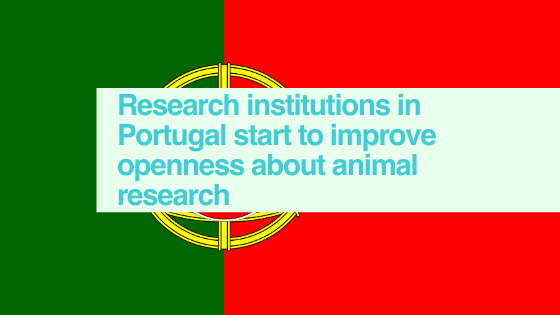EARA study of EU-based websites 2024 - results in Portugal
- Apr 29, 2024
- 4 min read

A study of the websites of biomedical research bodies in Portugal, by the European Animal Research Association (EARA), to assess how openly they discuss their research using animals, shows that signatory institutions of the Portuguese Transparency Agreement (TA) are far more open about their work.
The EARA Study of EU-based websites 2024, published today, analysed a total of 908 websites across the EU in 2023, and the report has now been presented to the EU Commission. In Portugal, 46 institutional websites were assessed, both public and private bodies, such as universities, research centres and pharmaceutical companies, and the main findings were that:
Three quarters (73%) of the institutions in the Portuguese TA have a clearly recognisable public-facing statement acknowledging their use of animals – one of the most important categories in the study. However, the overall rating for Portugal dropped to 37% when the figures included institutions not in the TA.
Portuguese TA signatories also performed well in other categories assessed, including the use of images and video, more detailed information about animal research and the prominence of that information on the website, with two thirds (68%) of the signatories meeting these criteria. If non-TA institutions are included in the assessment figures the overall scores are much lower and well below 50%, except for images and video (48%).
Launched in 2018, the signatories of the Portuguese Transparency Agreement on Animal Research - now with 22 institutions as members - have all pledged to be more open about their use of animals and report on this annually.
EARA Executive Director, Kirk Leech, said: “Portuguese institutions have made great strides towards being more open about their use of animals in research and the signatories of the Transparency Agreement, in particular, are setting a benchmark for the rest of the EU.”
Transparency Agreements have been a successful launchpad, across Europe, for greater efforts to produce useful information for the public about research at individual institutions, and have led to a greater commitment by institutions to be more open (there are agreements in Belgium, France, Germany, Netherlands, Portugal and Spain).
Since the previous EARA study in 2020, stricter criteria have been introduced into the assessment categories, so it is not possible to make comparisons. When EARA first began assessing websites, back in 2017, the presence of good quality institutional website content on animal research was scarce, since then significant improvements have meant that it has been possible to raise the benchmark.
EARA is now confident that, if an institution can reach the required standard in all categories, they will be providing the public with the comprehensive information they need to make informed opinions on the use of animals in biomedical research.
For further information contact EARA Communications Manager, Bob Tolliday, btolliday@eara.eu on +44 (0)7970 132801
Notes to editors
About EARA
The European Animal Research Association (EARA) is an organisation that communicates and advocates on biomedical research using animals and provides accurate, evidence-based information. It has more than 170 member organisations, including private and public research bodies, universities, regional and national biomedical associations and suppliers, in 24 European countries (19 in the EU) and four other continents.
EARA’s vision is that animal research is understood by society as still a critical part of the scientific process, leading to an informed and beneficial climate for innovation and progress for the benefit of human and animal and environmental health.
Signatory institutions of Transparency Agreements, co-ordinated by EARA, commit to demonstrating openness and engaging in a dialogue with the public, to bring about a greater understanding of the reasons why animals are needed for research.
The website study has helped EARA identify areas of good practice on communications and openness in the life sciences sector and areas where improvement is needed. It will also help EARA provide guidance on best practice to all its member organisations and the sector as a whole across Europe and build on the advice already given to EARA members in the EARA Communications Handbook.
The study is therefore a tool that can then be used to encourage greater transparency in line with the recommendations made in Section 3 of the Review of Directive 2010/63/EU in November 2017.
The benefits of animal research
Most of the medicines we use have at some point involved research using animals. Animals are essential in research on Covid-19 for understanding the virus, and for assessing potential drugs and vaccines. They will help millions with conditions such as cystic fibrosis, Alzheimer’s disease, spinal cord damage and parasitic infections like malaria. There are three main reasons why animals are used in research:
To advance scientific understanding
To develop solutions to medical problems
To test medicines and vaccines in order to protect the safety of people, animals and the environment.
Animals are used when there is a need to find out what happens in the whole living body, which is far more complex than the sum of its parts. It is very difficult, and in most cases simply not yet possible, to develop non-animal methods to replace the use of living animals.


